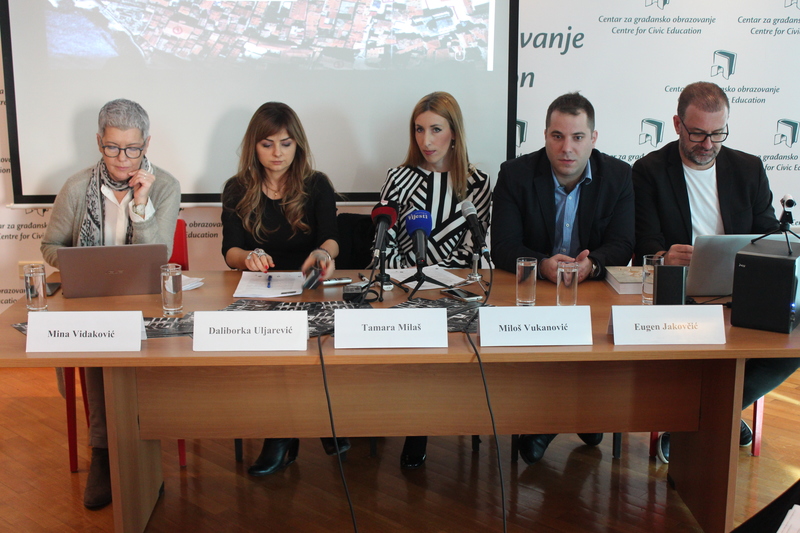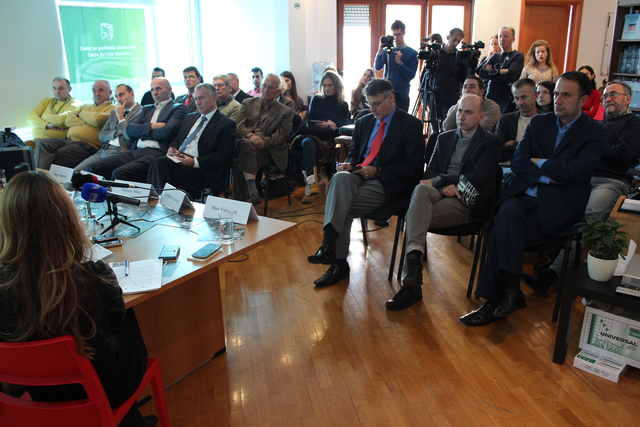On the occasion of 6 December, date when the attack of Yugoslav People’s Army and Montenegrin reservists escalated in Dubrovnik 25 years ago, Centre for Civic Education (CCE), Centre for transitional justice (SENSE) and Center for dealing with the past (DOCUMENTA) organised the presentation of interactive narrative “Targeting History and Memory”.
Daliborka ULJAREVIĆ, CCE executive director, reminded that CCE, either independently or in cooperation with partner organisations, has been continuously reminding how important it is to prevent the targeting of history and memory. “In that regard, we believe that this interactive narrative represents an important contribution to everyone in civil sector as well as to institutions which carry an enormous responsibility within their competencies, which almost systematically refuse to face our recent past in an adequate manner”, she stated.
Uljarević added that Montenegro is further encumbered by “non-changing nature of government, which structures, or closely related ones, are still saturated by many who waged the so called “war for peace” in different forms. That approach wrote the most shameful page in Montenegrin history, which is still carefully curtailed from our pupils, high school and faculty students, in the official textbooks, and still lives”, she assessed. Referring to the recently published information that the municipality of Budva paid the peace awards for Montenegrin politicians, she told that “there is no money that can “buy” a new version of history or suppress the memories – primarily of victims and their families, or the memories of us all who are obliged to work on the creation of accurate, official and objective records on war crimes and other severe violations of human rights committed on the territory of former SFRY, whereby the initiative for REKOM provides a significant contribution, as well as every other complementary initiative such as the one we present today”.
Mina VIDAKOVIĆ, author of narrative “Targeting History and Memory”, from SENSE from Croatia, reminded that “Targeting History and Memory” was originally designed to be the first project of SENSE – Centre for transitional justice, given that it equally covers all of the belligerent factions from the wars of nineties, both as victims and perpetrators of crimes against the cultural heritage. “Like in the case of previous narratives, this one is also based on the findings of Tribunal of Hague. However, this time it conveys another message and provides a universal dimension. Narrative has six segments with identical structure – the introduction is followed by a short film of 10 minutes, then with the selection of documents, photographs, audio and video footage which was used in the proceedings before the Tribunal of Hague, with trials for crimes against cultural heritage”, she clarified.
She pointed out that by destroying the cultural heritage in wars, belligerent parties convey the following message to one another: “we don’t appreciate you and we don’t want you here”, by quoting the expert of UNICEF for the protection of cultural heritage and one of the participants of new web narrative “Targeting History and Memory”.
Miloš VUKANOVIĆ, curator of National museum of Montenegro, stated that after the work on research of human casualties and media’s aggressive campaigns, finally the chapter on the destruction of cultural heritage was opened, adding that “this programme presents a beginning for the examination and potential answer to question whether this was the case of a systematic destruction of cultural heritage”. He expressed regret that Montenegrin system of education does not tend to develop awareness on the importance and destruction of cultural heritage. “National historic museum is the only place which notes the importance of this issue, by highlighting the items related to this subject, and emphasising that Dubrovnik was one of the ugly spots in Montenegrin history.”
Eugen JAKOVČIĆ, media coordinator of Center for dealing with the past – Documenta from Croatia, pointed out that this was an event of partner organisations which aim to sensitize the Montenegrin public and institutions regarding the prosecution of war crimes in the event of Dubrovnik. “The value of narrative which we present today in Podgorica, following similar presentations in Zagreb, Belgrade and Sarajevo and the one planned for Pristina, lies precisely in the fact that it provides an overview of facts disclosed in one of the rare trials before the International Criminal Tribunal for former Yugoslavia in the context of crimes committed during the siege and destruction of Dubrovnik”, he added.
“Deliberate destruction of cultural and religious objects on the territory of Bosnia and Herzegovina, Croatia and Kosovo, during the post-Yugoslav wars presents the worst-case scenario of destruction of cultural heritage in Europe after World War II. During the war conflict, amid the disintegration of Yugoslavia – process characterised with stratification and complexity, one of the key goals was to destroy the ethnical identity of enemy, during the campaign of ethnical cleansing”, Jakovčić emphasised.
The event was moderated by Tamara Milaš, programme associate at CCE and PR of Coalition for REKOM in Montenegro.
Interactive narrative Targeting History and Memory shows in detail the nature of severe crimes against cultural, historic and religious heritage, committed during the wars of nineties in Croatia, Bosnia and Herzegovina and Kosovo, which were investigated, reconstructed and processed before the International Criminal Tribunal for former Yugoslavia (ICTY). Special chapter is dedicated to numerous religious and cultural monuments for which destruction no one was held accountable, including the ones on the territory of Dubrovnik.
Presentation of narrative was attended by more than 30 representatives of NGOs, media, political parties, institutions and interested citizens.
Narrative is available at: http://www.heritage.sense-agency.com/bhs/
Svetlana Pešić, programme associate


